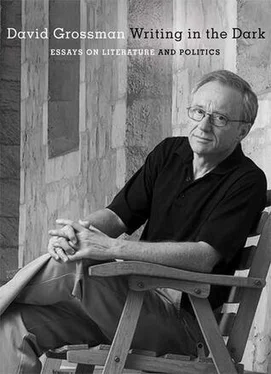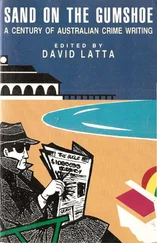I must also talk of the price of life without hope. Of the rise of a fatalistic, defeatist frame of mind that has caused many Israelis to feel that the situation will never improve, that the sword shall devour forever, and that there is some sort of “divine decree” that dooms us to kill and be killed for eternity. Fifty or sixty years ago, the new Jewish settlement movement (the yishuv ) in young Israel was prepared to make any sacrifice, because it felt that its purpose was singularly just. Whereas now, for significant components in Israel, the purpose no longer seems just; at times, it is not even clear what the purpose is . This lack of meaning, this lack of faith in our leadership and its ways, slowly gnaws at the heart of the matter: at the faith in the just existence of the State of Israel. This internal loss of faith strengthens the view, among certain circles, that the entire State of Israel — not only the settlements — is an act of colonial, capitalist injustice, carried out by an apartheid regime, detached from historical, national, and cultural motives, and therefore illegitimate.
Ending the Occupation could begin to heal some of these internal wounds. I do not believe that a decisive change will happen quickly, but even if it occurs in a generation or two, it can start to bring Israel back from the digressions it has taken from its own ethos. If this happens, there may also emerge a new possibility for the creation of a fascinating synthesis between two fundamental models of the Jewish people: on the one hand, the Jewish Israeli living in his own land, embedded in the earth and the landscapes, the rooted man whose daily reality encompasses all the contradictory layers of reality; and on the other hand, the universal, cosmopolitan Jew who aspires to fulfill a spiritual, moral mission, to be “a light unto the nations,” to be the voice of the weak and the oppressed everywhere, to represent a clear, firm value system that derives its strength from ideas, from contemplation, from ethical commitment, who sees in every person a great creation, unique and unrepeated, in the spirit of Isaiah’s prophecy and the prophecies of modern thinkers such as Franz Rosenzweig, Martin Buber, and George Steiner.
Think for a moment of the possible merging of these two models! Think of an Israel that manages to create for itself a new, unique place in the family of nations, becoming a self-confident sovereign state whose identity, heritage, and power derive from a universal human commitment, participation in the troubles of the world, and an insistence on taking a moral stand on questions of society, policy, and economics — an Israel that offers humanitarian aid anywhere it is needed. In other words, a State of Israel that fulfills the Jewish people’s historical and moral destiny within human history.
Sometimes a thought steals into one’s heart: What would have happened had Israel been able to emerge and live on as a unique national creation rather than, with remarkable speed, turn into a clumsy and awkward imitation of Western countries? What would have happened if Israel had made a national and social choice far more daring and far-reaching than the one in which it is currently stagnating? A choice that combined what is often called “the Jewish genius” with the loftiest universal and Jewish ideals, together with a humane economic and social system that centers on people and not on capital and competitiveness; a choice that had some unique, even genius spark — as did, for example, the kibbutz idea at its inception, before it eroded and crumbled, and as did the contributions of Judaism to many varied areas of human existence, in science and economics, in art and moral philosophy.
I know that these ideas sound utopian, perhaps even naive. But there is a shred of utopian thought and wishful thinking in everything I have said. It is certainly possible that part of my own private healing process — perhaps not only my own — from the almost-chronic disease of the “situation” is to once again believe that it is possible to escape from the shackling, desperate day-to-day, from the great mistake that looms over our every step and gradually stifles our souls, from the cynicism that tramples every hope.
I must also admit that I am a great believer in “acquired naïveté,” by which I mean a conscious and determined decision to be somewhat naive, precisely in a situation that is all but rotting away with sobriety and cynicism, that for years has been leading us astray. It is a naïveté that knows full well what it faces and what it contends with, but it also knows that despair creates more despair, hatred, and violence, while hope — even if it is the product of this “acquired naïveté”—may very slowly bring about the mechanisms of prospect, of faith in the possibility of change, of extricating oneself from an eternal victim mentality.
I have mentioned the sense of identity, and of being at home, which Israelis might derive from a peace agreement. But one cannot talk of a home without mentioning its walls, the borders . In the fifty-six years of Israel’s existence, there has not been a single decade during which the country had permanent and stable borders. In 1947 an international border was established, and immediately moved as a result of the 1948 war. In 1956 the southern border was altered following the war with Egypt and the occupation of the Sinai Peninsula, and its subsequent evacuation. The Six-Day War in 1967 expanded Israel’s area fivefold, unrecognizably altering its borders to the north, east, and south. The war of 1973 and peace with Egypt in 1977 once again redrew Israel’s borders, severing it from the Sinai Peninsula. The 1982 Lebanon War brought the Israeli army deep into Lebanese territory, and essentially pushed the border a few dozen kilometers to the north for eighteen years. The Oslo accords in 1993, and peace with Jordan in 1994, changed Israel’s eastern border with Jordan and the Palestinian Authority. This eastern border is utterly breached, illusory even, because of the massive presence of settlements in the heart of the Palestinian areas.
Incidentally, the only border that Israelis find instinctively clear and concrete is their western one — the sea. If I were to say this in Israel, everyone would nod understandingly, although the notion may not be very politically correct. (It is interesting that the sea, the most unstable, fluid, and deceptive natural element, is the one that in our perception is the only stable border.)
The citizens of Israel have no clear concept of a border. Living this way means living in a home where all the walls are constantly moving and open to invasion. A person whose home has no solid walls finds it very difficult to know where it “ends” and where the next home “begins.” The result of this ambiguity is that such a person’s identity is always on the defense, always “contra” to those who threaten him. This condition provokes in his neighbors a constant temptation to invade, and his own behavior is characterized by a tendency to be overly defensive — meaning aggressive. The choices he makes in moments of distress or doubt are virtually doomed to be hasty and belligerent. The lessons he is capable of learning from his own history are bound to be the most extreme, and therefore often the most simplistic, the least nuanced — lessons that often damage his perception of reality.
In a certain sense, the State of Israel is replaying one of the most problematic anomalies of the Jewish people in the Diaspora, and the root of its tragic existence over the past two thousand years: it is a nation living among other nations, most of whom are hostile, with no clearly defined borders. This means that every contact may be experienced, by both parties, as a dangerous infiltration into sensitive, loaded identity regions.
Читать дальше












